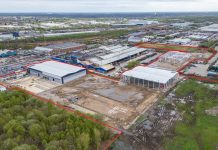The march of the flexible workspace is evolving and is set to further penetrate the office market says real estate advisor Cushman & Wakefield, in a new report, Coworking 2019: The UK Flexible Evolution Continues.
Despite political headwinds, flexible workspace operators let more than 1.2 million sq ft of space across 40 transactions in Central London during H1. If letting activity progresses at the same rate for the remainder of 2019, Cushman & Wakefield predicts flexible workspace take-up to exceed two million sq ft for a third successive year.
In the major regional markets, take-up of traditional office space by flexible workspace providers has grown significantly in the last few years. Almost 800,000 sq ft of new space across the major regional markets
was acquired by flexible operators in 2017 and 2018, compared to just 100,000 sq ft in 2016. This trend is set to continue, driven by an evolution in both working practices and growth sectors across the UK.
Cardiff
In Cardiff, 21,419 sq ft of space was let to flexible workspace providers in the first six months of the year.
Chris Terry of Cushman & Wakefield’s National Office Agency team based in Cardiff, commented: “The serviced office market in Cardiff is traditionally focussed in the City centre and is currently served primarily by local and regional operators offering varied levels of specification from high end to budget space. Excluding Regus who operate out of three locations in Cardiff, many of the larger operators including WeWork, Spaces, Orega have all considered Cardiff but are yet to commit, and the lack of grade A office space in the City centre which currently stands at only circa 100,000 sq.ft is likely to be providing an obstacle against some of the larger occupiers entering the market.
“In 2018, Biz Space purchased Trafalgar House an income producing office on the fringe of the City centre and Chadwick Business Centres took a lease on W2 Wellington Street. So far this year, there have been two deals of note comprising 21,500 sq ft including Chadwick Business Centres acquiring 12 Cathedral Road rebranding it C12, and Work & Meet Ltd are now operating out of two floors at 3 Alexandra Gate.
“With high occupancy levels reported from existing operators in Cardiff, and Spaces seeking to gain a foothold in Cardiff, we expect further take up and growth over the next 12 months.”
Other Regional Cities
In 2018, take-up by flexible workspace operators in Manchester reached 107,000 sq ft, bringing the five-year total to nearly 280,000 sq ft. Similar trends have been seen in Birmingham, where 2018 flexible workspace take-up reached 101,000 sq ft, bringing the five-year total to over 316,000 sq ft. Glasgow and Leeds have both attracted flexible workspace take-up in excess of 100,000 sq ft between 2014 and 2018.
Looking ahead, Birmingham and Manchester are likely to continue to cement themselves as the regional flexible workspace hotspots, whilst flexible providers continue to seek new opportunities in potential growth cities across the UK.
The Supply Challenge
The development pipeline of speculative office space in Central London and the majority of the UK’s cities remains particularly thin and could prove to be a barrier to growth at the rate we’ve seen in recent years.
Christopher Dunn, from Cushman & Wakefield’s UK Research & Insight team, said: “Acquiring suitable stock will be a challenge for flexible workspace operators, particularly at a time when off-plan pre-lets are removing space from future supply at a growing pace. However, in those markets where large, quality buildings can be brought to market, the flexible offering is likely to flourish. In markets with very limited space in the pipeline, there are opportunities for commercial developers to lead the market.”



















